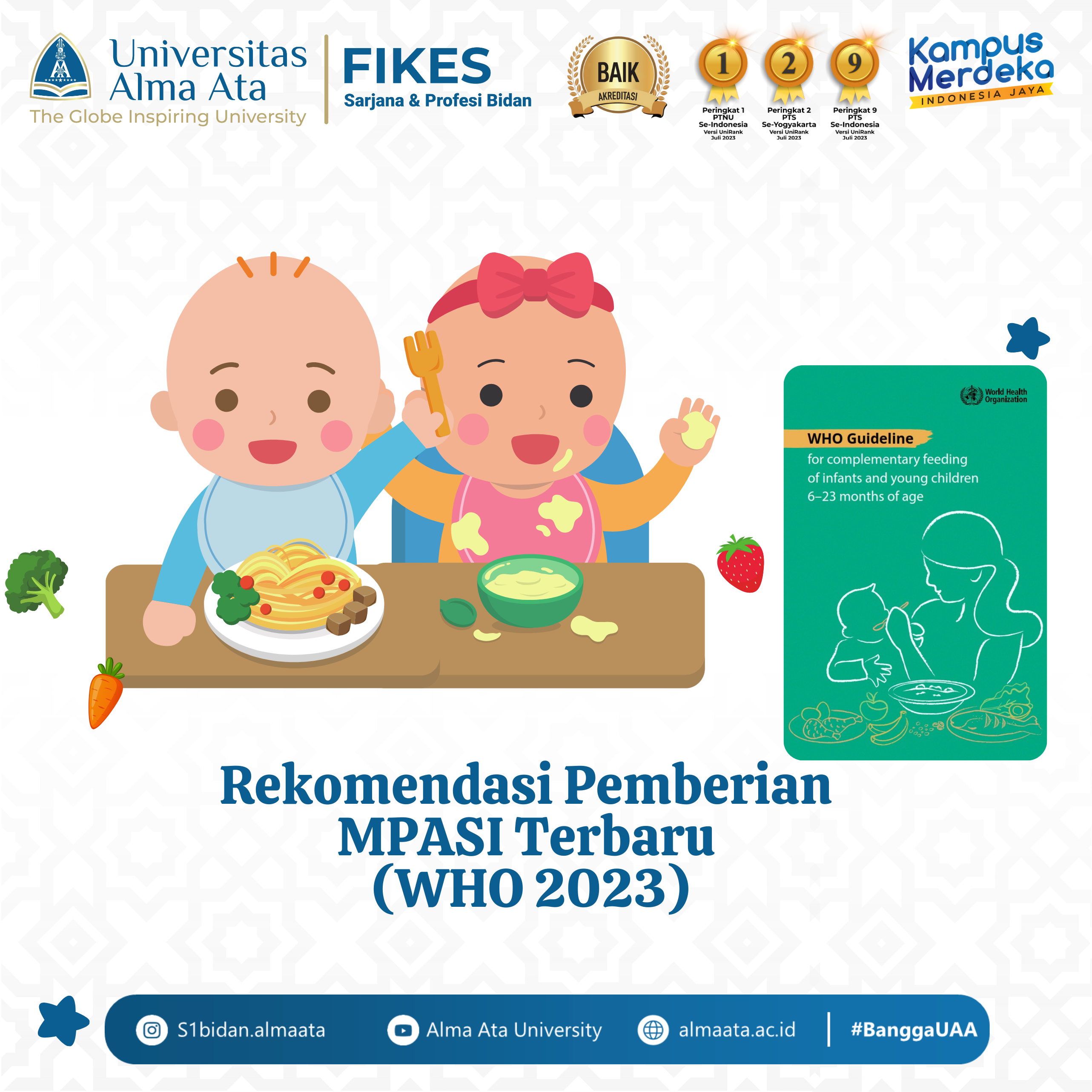
Bachelor of Midwifery Study Programme of Alma Ata – The first 1000 days of a child’s life is a critical period for brain development, language, sensory, and the development of higher cognitive functions. The consequences of malnutrition between pregnancy and 24 months determine morbidity and mortality rates, impaired growth and development, slow motor development, intelligence, and social-emotional development. In the long term, undernutrition in early childhood results in reduced work and reproductive capacity.
The age of 6-24 months is a critical period when children learn to accept HEALTHY food and drink and determine a sustainable diet. At 6 months, infants should be introduced to complementary foods while breastmilk should be continued. Iron in breastmilk is highly absorbable, however some babies are at risk of iron deficiency anaemia especially if born prematurely or with low birth weight.
Here are the latest guidelines from the World Health Organisation (WHO) 2023 regarding the Guidelines for complementary feeding.
- Infants aged 6-11 months who are not breastfed (non-breastfed infants), can be given formula or animal milk, full fat. While infants aged 12-23 months can be given animal milk, yet continued formula milk is not allowed.
- Dairy products are part of the diversity of intake, especially for non-breastfed children when other animal proteins are not available. Flavoured or sweetened milk should not be used. And safe storage and handling of animal milk should be followed.
- Infants aged 6-23 months require dietary diversity. Animal protein sources, fruits, and vegetables should be consumed daily. Pulses should be consumed frequently especially if animal and vegetable protein is limited.
- Early complementary foods, even if fortified with iron, are NOT sufficient to prevent anaemia in high-risk populations (e.g. pregnant women with severe anaemia, dietary habits without animal protein, malaria endemic areas, etc.).
- Starchy staples NEED TO BE LIMITED (as they do not meet the quality of protein as in animal protein and are not a source of essential minerals and vitamin B12. Some are antinutrients that decrease nutrient absorption). If the staple meal is already carbohydrate, then the snack should be protein, such as quail eggs.
- It is best to choose whole/natural foods, and minimise refined ones (e.g. use rice instead of rice flour. Choose or process corn instead of cornflour).
- Foods and drinks high in sugar, salt and trans fat should not be consumed (found in packaged products, including various biscuits and crisps).
- Sugar-sweetened beverages should not be consumed (found in boxed milk, various packaged juices, sweet tea, syrup, etc).
- Non-sugar sweeteners should not be consumed (including malitol, xylitol, sorbitol, maltodextrin, aspartame etc).
- In addition, the consumption of 100% fruit juice should be limited (children must learn to eat fruit, not drink juice, the risk of diarrhoea is high due to hygiene issues).
- It is not allowed to consume ULTRAPROSES products (manufacturer packaged, or home industry with manufactured ingredients/chemicals).
- In certain contexts, when nutritional needs are not met, children 6-23 months benefit from supplements or fortified food products. Such as supplements that can add certain vitamins and minerals, but still WITHOUT displacing the daily staple food.
- For those who already consume fortified packaged foods, it may increase micronutrient intake, however, consumption of fortified foods SHOULD NOT be supported.
- There is NO substitute for a diverse diet consisting of healthy, minimally processed (home-grown) foods.
- Responsive feeding/ feeding according to the child’s hunger and satiety signals. The principle is to encourage children to eat according to their physiological drives and developmental needs.

